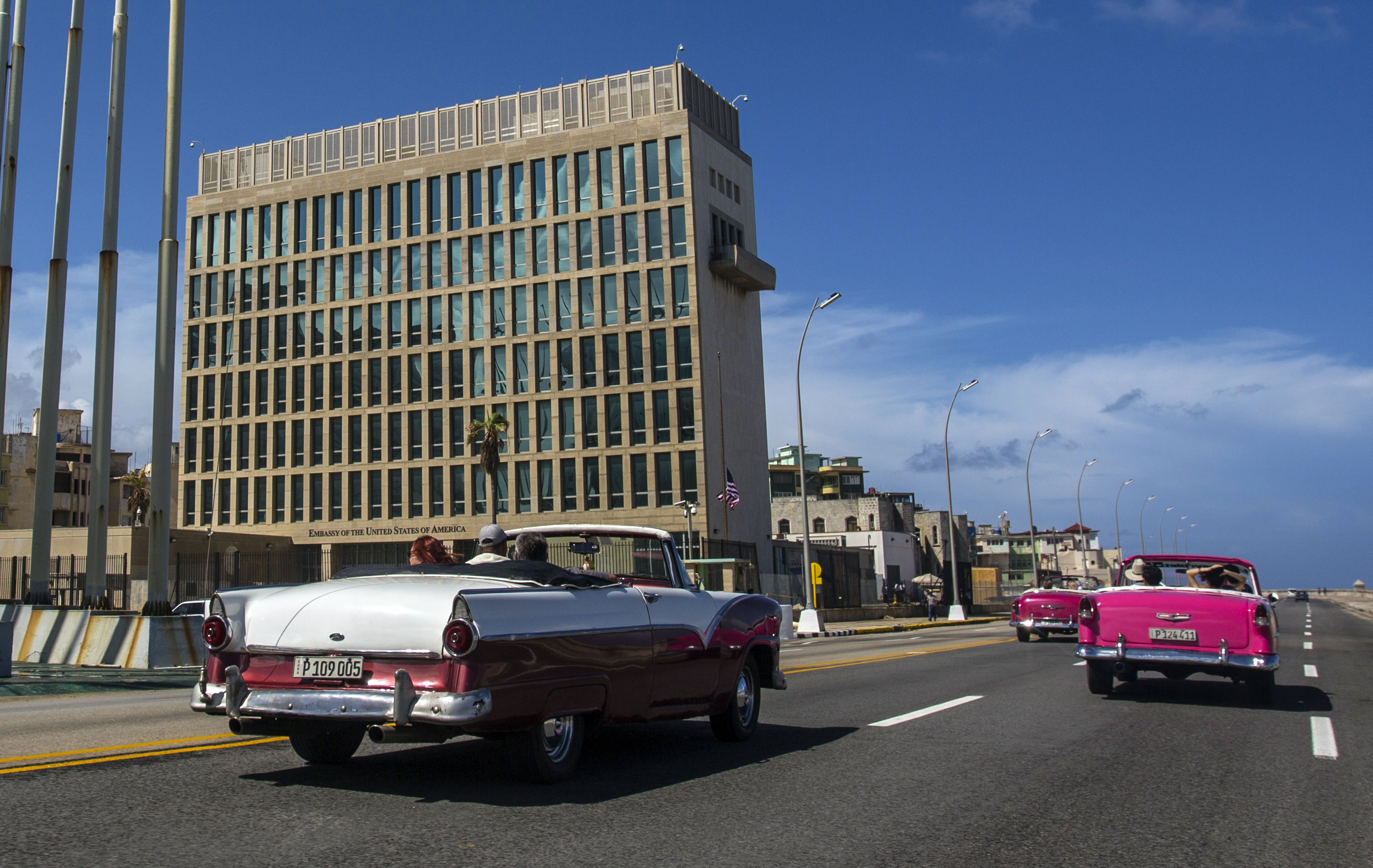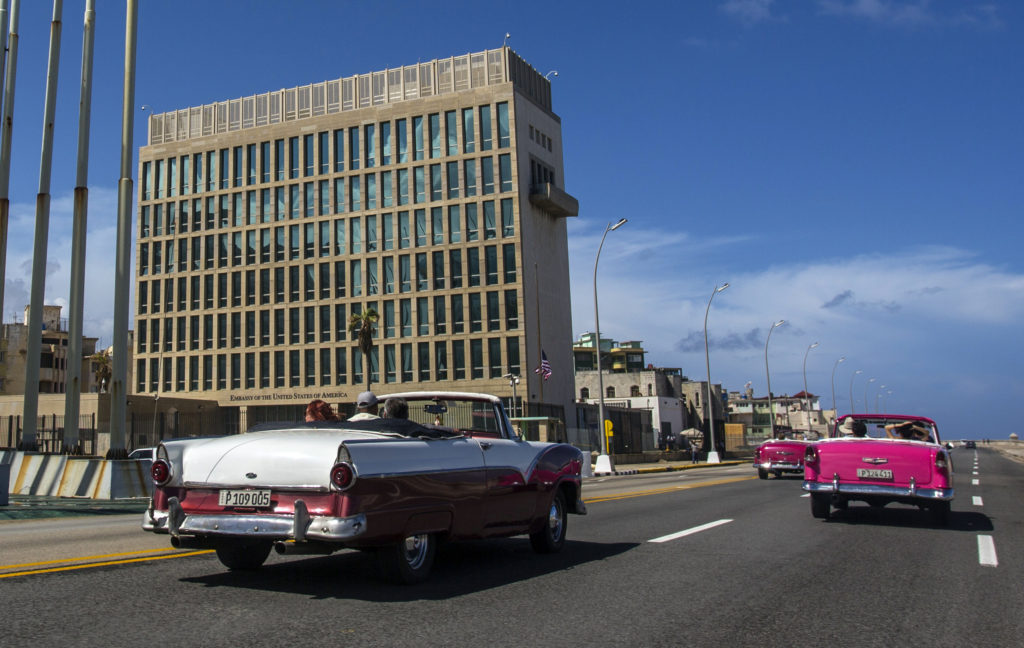The U.S. should not close our embassy in Cuba
{$excerpt:n}


(AP Photo/Desmond Boylan)
For the last few months, bizarre news has come out of our newly-reopened embassy in Havana, Cuba. Dating back to late 2016 and occurring as recently as August 21, American diplomats stationed in the embassy have experienced a wide range of injuries including headaches, nausea, hearing loss, and in some more hazardous cases, mild traumatic brain injury. The cause of these injuries is unknown, but U.S. intelligence suspects it is likely some sort of sonic attack.
The situation is now being closely monitored by the Trump administration. Most recently, Trump expelled 15 Cuban diplomats in response to the sonic attacks targeting US embassy staff in Havana.
When Secretary of State Rex Tillerson was asked about the possibility of closing the embassy on CBS News’ Face the Nation, he answered, “We have it under evaluation.” When further pressed, he continued, “It’s a very serious issue with respect to the harm that certain individuals have suffered. … It’s under review.”
Although this was just one comment on an evening Sunday show, the idea has caught on with a lot of conservative commentators and politicians. Five Republican senators wrote a letter to Tillerson asking for immediate action, including expelling Cuban diplomats from the U.S. and strongly considering closing the embassy.
But closing the embassy would be the wrong idea.
Of course, this sonic attack is a serious issue that the U.S. should not treat lightly. The Cuban government is derelict in its duty of protecting our diplomats. Although Cuba denies any involvement (of course), it is highly doubtful that they did not know anything about it or know who might be involved.
The primary reason the U.S. should not close our embassy, however, is because we do not even know what is causing the sonic attack. The U.S. cannot definitively say that the Cuban government is behind it. Although the health and well-being of American diplomats is paramount, closing the embassy, even temporarily, would carry strong implications.
Closing the embassy now, without identifying the culprits, will reek of political motivation. After President Trump rolled back parts of Obama’s rapprochement this summer, the Cuban government would easily be able to paint a picture of either a weak U.S. retreating from its tough stance, or an overly hostile U.S. reneging on its deals and further hurting the Cuban people. Dictatorships thrive off of PR coups like this – especially a dictatorship like Cuba’s, whose communist ideology is rooted in anti-Americanism. Closing the embassy will look more like posturing than punishment or protection.
Additionally, closing the embassy is politically and practically impossible. It is arguable that President Obama overestimated Cuban-American support for ending the embargo, as evidenced by the strong negative reaction in Little Havana to his policies and Trump managing to maintain the high level of support Republicans typically earn from Cuban-Americans (even outperforming Mitt Romney’s 2012 performance, depending on which pollster you ask).
However, for personal and familial reasons, Cuban-Americans still largely support a change in policy from what we have been doing the last 50 years. Regardless of whether or not the embargo is good policy, the Trump administration cannot look like it’s returning to the status quo. Regardless of the merits or faults of reopening diplomatic and trade relations, it has already been done. Cuba is no longer the politically and economically isolated country it was at the end of the Cold War. It would cost too much political capital to reverse it, so the U.S. would need a very good reason to do it. For reasons already stated, this is not one.
With all this being said, the sonic attack is still a serious issue. So what is President Trump to do? He must continue to draw tough policy on Cuba.
It is perfectly fair to expel Cuban diplomats from the U.S. After all, the Cuban government has failed to protect our diplomats irrespective of their culpability. Closing down certain functions or offices of the embassy is also appropriate, until a cause can be clearly ascertained – just not a full closure.
Trump must also outline a clear policy on Venezuela, since the crisis there is inextricably linked to Cuba. He has already laid out a vision for Venezuela, including before the United Nations General Assembly, but actual policy needs to come next. He should lean on Florida Senator Marco Rubio for assistance. Senator Rubio has already displayed his expertise on these issues on several occasions and has also shown to be the most effective Republican senator when it comes to influencing Trump, from Latin American foreign policy to child care.
Action most definitely should be taken against Cuba, but closing the embassy altogether would be an overreaction with repercussions that could undermine our position on the island as well as domestic support, preventing meaningful action that could challenge the Castro regime.
The post The U.S. should not close our embassy in Cuba appeared first on Red Alert Politics.
Source: Red Alert Politics



